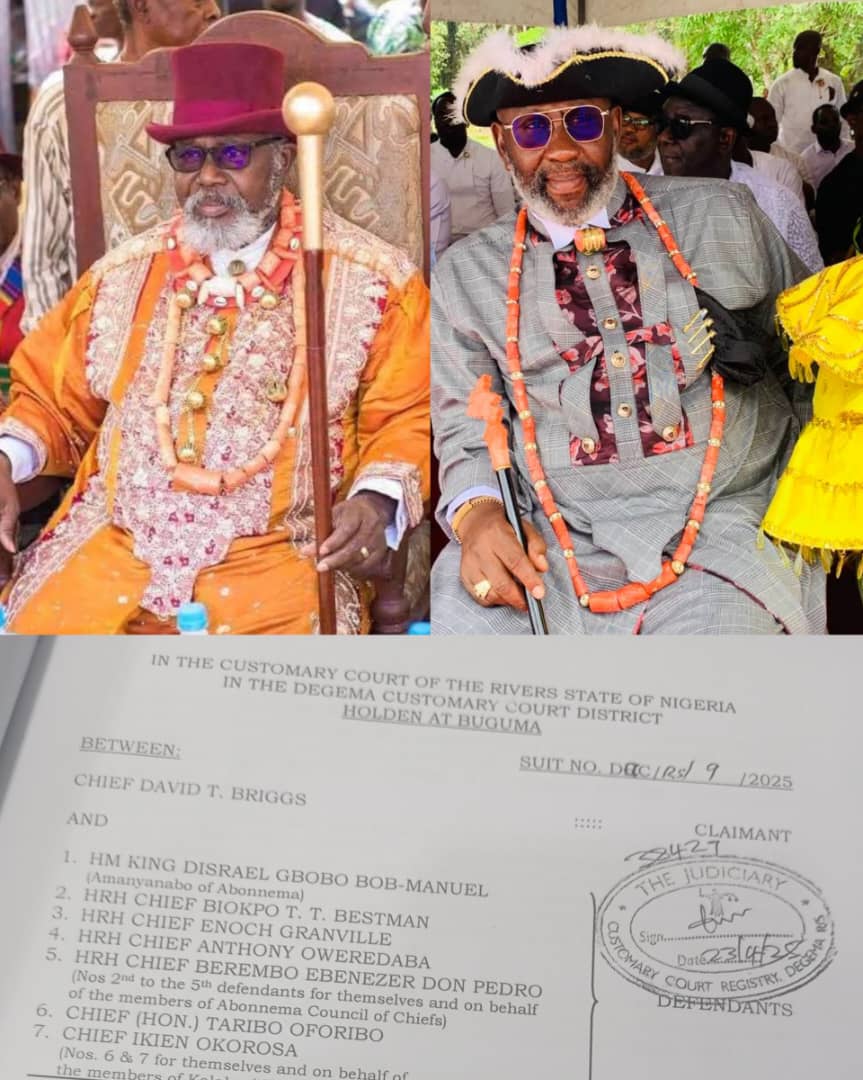ABONNEMA KING SUED OVER SORCERY CLAIM
Published on 01 May 2025
A high-profile legal battle has erupted in the Degema Customary Court District, Rivers State, as Chief David T. Briggs, a prominent traditional ruler and member of the Kalabari Ekine Sekiapu, has filed a lawsuit challenging the continued reign of His Majesty, King Disrael Gbobo Bob-Manuel, the Amanyanabo of Abonnema.

In a suit filed under Suit No. DCC/RS/9/2025 and dated April 23, 2025, Chief Briggs is seeking several declarations and orders from the court, including the dethronement of King Bob-Manuel. Central to the matter is an unresolved accusation of witchcraft—locally referred to as aribo—which, according to Kalabari native laws and customs, renders anyone so accused and uncleansed ineligible to occupy a traditional stool.
Chief Briggs, who also serves as the paramount chief of the Duein-Ala Chieftaincy House in Abonnema/Kalabari and a personal chief of the Ideriah family in the Oruwari Chieftaincy House, claims that the lingering allegation of sorcery against the monarch has brought dishonour and shame not just to the palace, but to the entire Abonnema kingdom.
According to court documents, the dispute dates back to 2012, when one Adokiye G. I. Akamaka publicly accused the Amanyanabo of being an aribo. King Bob-Manuel subsequently initiated defamation suits in two separate matters—Suit Nos. DHC/8/2013 and DHC/10/2017—in an attempt to clear his name. However, both cases were decided against him.
In his claim, Chief Briggs argues that by failing to appeal the rulings or undertake any form of traditional cleansing, the Amanyanabo has effectively accepted the label of being a sorcerer, thereby disqualifying himself from continuing on the revered throne under Kalabari customs.
“The presence of an aribo on the throne of Amanyanabo is an abomination,” the claimant stated, further alleging that the inaction of the Kalabari Ekine Sekiapu—the custodian of Kalabari customs and spiritual authority—has enabled a continuing desecration of their sacred traditions.
Joined in the suit as co-defendants are other prominent chiefs and members of the Abonnema Council of Chiefs, as well as leaders of the Ekine Sekiapu. Chief Briggs is asking the court to compel them to enforce native laws by barring the Amanyanabo from attending meetings or performing sacred functions.
Among the reliefs sought are:
A declaration that anyone accused and un-cleansed of witchcraft under Kalabari customs cannot remain on the throne.
An injunction restraining King Bob-Manuel from parading himself as the Amanyanabo.
Orders compelling the Kalabari Ekine Sekiapu and Abonnema Council of Chiefs to stop recognizing the 1st defendant in his official capacities.
Chief Briggs insists that the continued occupation of the throne by someone accused of spiritual impurity has subjected him and other Abonnema indigenes to ridicule and stigmatization both within and outside Kalabari land.
“The claimant suffers mockery wherever he goes,” the court filing states. “He is greeted as the subject of a sorcerer-king, a stigma that Kalabari culture likens to leprosy.”
The unfolding case has sparked renewed debate over the role of native laws and customs in modern governance, especially concerning the sanctity of traditional stools.
As of press time, neither the Amanyanabo nor his legal representatives have publicly responded to the suit.


